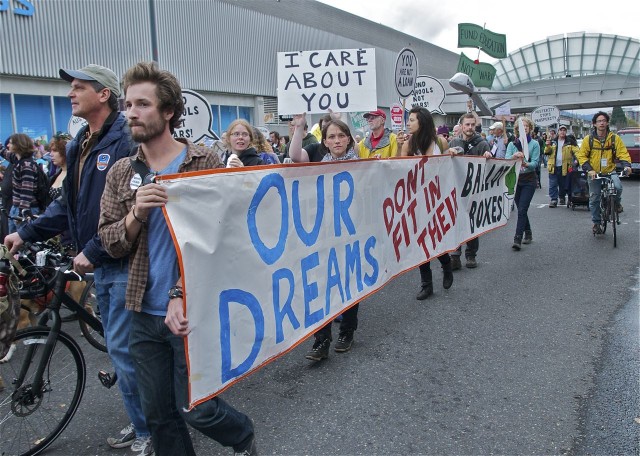By Gina Ronning
The Portland Action Lab is currently embarking on what is sure to be a difficult conversation exploring group purpose, structure, and other aspects of self-evaluation. This dialogue is a crucial component for any group in assessing success and goal achievement. How meaningful this discussion will be is entirely dependent upon the level of authenticity, honesty and transparency the group is willing to grant itself through this process.
The conversation is taking place among numerous organizing groups associated with the energy and passion derived out of the Occupy movement. It is no secret that organizing capacity and event turnout is dwindling for many of these groups, including Occupy. When we look to the recent election outcomes we find there is a large public outcry for economic and social justice. Perhaps these outcomes do not reflect the level of radical change that many on the far left are seeking, but it’s a start. Any perceived lack of public support and participation may have less to do with the issues on the table and more to do with how people prefer to deal with them. If a movement for economic justice is to grow and be successful, activists must be willing to critically examine some of the internal pitfalls that contribute to the challenge of movement building.
Part of building a successful social movement lies in the ability to pull in individuals and groups from a wide demographic, including, but not limited to: age, gender, sexual orientation, race, ethnicity, class, spiritual traditions and more. Often political action groups claim they want this, but repeatedly fall short of understanding the complex and difficult steps required to make it happen. One of the contributing factors is the insidious culture of competition from which even leftist social activists are not immune. This culture of competition manifests in a variety of ways, for instance in the “competition of struggles”. Time and time again we see this occurring among groups and individuals, who, instead of mutually supporting diverse needs through collaboration, compete for power, voice and leadership. This competition leads to mistrust, isolation, and the formation of exclusive groups. These groups then cling to themselves, organize only amongst each other, and as a result, fall out of touch with the reality of the lived experiences of others outside the immediate circle.
The exclusive nature of some groups also creates a sense of group identity. This identity is often equated as the struggle itself, making it even more difficult to foster an environment of collaboration. Though identity and struggle are intimately connected, they are not the same. Successful movement building must able to recognize this difference, and openly work through the needs presented by diverse identities and struggles.
When a particular identity becomes the struggle, it becomes blind to the diverse needs of the many. Instead of competing, a successful social movement must be able to acknowledge and honor the different types of struggles that people everywhere are going through, particularly in a society which creates helplessness, dependency, fear, anger, rage, violence, oppression and economic deprivation.
We all have stories to tell, and our unique perspectives have the potential to widen the community of truth. If a social movement can transcend the inherent challenge of diversity, it will gain a monumental advantage over any system dependent on competition. It will also be able to formulate a very inclusive and attractive framework to a wider demographic of people, and in turn, will achieve the critical mass necessary to actualize movement goals.
There are, however, several obstacles that individuals and groups must be able to overcome if collaboration and mass mobilization is to be successful:
· We must actively listen to each other, even if what is being said is difficult to hear;
· We must acknowledge the needs, feelings and possible hurts of each other without being defensive;
· We must be able to speak and act with compassion towards one another, especially those offering different perspectives and experiences;
· We must meet people where they are, and take a step back if this is what is required in gaining the trust and participation of others;
· We must acknowledge the different forms of privilege which exist and take these into account as we seek to transcend issues of oppression and dominance;
· We must stay committed to the process and not walk out on each other even in the most difficult of moments;
· We must include and appreciate the passion and new ideas of youth while still respecting and including the wisdom of the elders or those with more experience;
· We must seek to find the humanity in all, and always grant each other the opportunity and possibility for this humanity to manifest even amongst those whom we consider our opponents;
· We must not let mistrust and paranoia undermine the possibility for radical inclusion and unprecedented unification;
· We must acknowledge that everything stated above presents a different type of struggle. We must therefore, grant each other the gift of patience and support as we all attempt to overcome what most in the world have not.
The grand strategy of successful movement building is in fostering healthy human relationships. This is also the grand strategy in fostering a healthy and peaceful society. We must remind ourselves of the values which inspired so many of us to act on behalf of social justice in the first place. We must also challenge ourselves to reach toward our highest human potential. Love, compassion, humility, honesty and empathy are radical virtues of our time. The movement that can successfully harness them will indeed become the greatest threat to injustice everywhere.








2 comments for “A Contemplation on the Building Blocks of a Successful Movement”